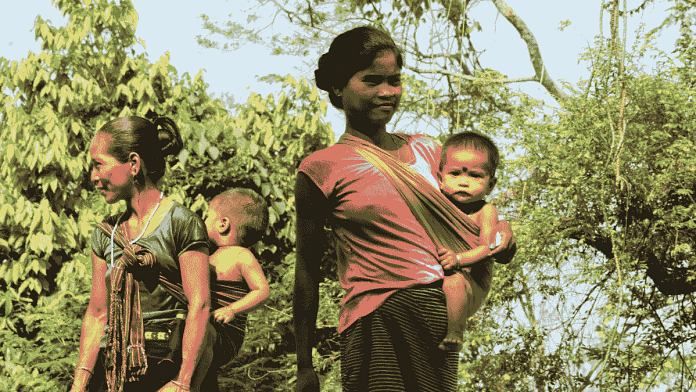New Delhi: A parliamentary panel has hauled up the Union tribal affairs and health ministries for having formulated policies on maternal health in tribal areas despite the lack of a separate maternal mortality rate (MMR) database.
Maternal mortality refers to deaths caused by complications from pregnancy or childbirth. MMR is defined as the number of maternal deaths during a given time period per 1,00,000 live births during the same time period.
In its report on ‘Health facilities for tribal women’ tabled in the Lok Sabha Tuesday, the Committee on Empowerment of Women observed that the Registrar General of India’s 2017-2019 Sample Registration System (SRS) report did not have a separate database on maternal mortality in tribal areas.
The committee observed that at 990, the sex ratio in tribal areas was better than the national average of 943, but that child marriage, early motherhood, low body mass index and high incidence of anaemia were causing “high rates of mortality among tribal women”. The observations were based on the health ministry’s response to the panel’s query on state-wise MMR data.
In its response, the health ministry quoted the SRS report to say that the national Maternal Mortality Rate is 103 per 100,000 live births.
“The committee fails to understand how the line ministries have so far evolved policies or are going to chalk out any action plan to secure maternal and infant health among the tribals without having proper MMR data,” the parliamentary panel said in its report.
The committee urged the ministries to compile MMR data for tribals and also emphasised the need to have a separate database on all aspects of tribal healthcare.
“The practice of subsuming tribal data in rural healthcare data has resulted in creating ineffective conclusions on implementation of available health programmes among tribal people,” the committee observed, adding that it was surprised to note that despite central government schemes such as Janani Suraksha Yojana (JSY) and Janani Shishu Suraksha Karyakram (JSSK), the “MMR and neonatal mortality rate are still high among tribals”.
Launched in June 2011, the JSSK entitles all pregnant women delivering in public health institutions to “absolutely free and no expense delivery, including caesarean”, according to the government. The JSY, on the other hand, is a scheme that integrates cash assistance with delivery and post-delivery care for women.
“The government does not have separate data on tribal beneficiaries of any of these schemes as it is clubbed with Below Poverty Line and Scheduled Caste also,” the parliamentary panel said in its report.
Also Read: BJP’s UCC gamble faces resistance from Northeast allies, RSS-backed outfit & its own tribal wing
Inadequate healthcare infrastructure, medical staff
According to the panel, while more than 50-60 percent of the tribal population depends on public healthcare, there are inadequacies in the system in terms of both infrastructure and human resources.
There is a shortage of 69 general duty medical officers, 3,186 specialists, 1,340 lab technicians and 607 staff nurses in tribal states in India, the report said.
“It is a matter of concern for the committee to learn that despite a slew of efforts taken under the National Health Mission to attract and retain doctors and specialists, tribal areas are still reeling under lack of quality healthcare and the efforts of the government have not shown any concrete results at the ground level,” the report said.
(Edited by Uttara Ramaswamy)



